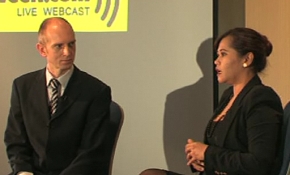
Steve Crowe: For our first webcast, and with global warming and Copenhagen grabbing headlines everywhere, we thought we’d like to explore one aspect of the role the pulp and paper industry might play in the global effort to reduce carbon emissions. Forests and forestry will probably play an important part in any carbon emission trading schemes or other things, and deforestation I think will be a hotter topic than ever, as time goes by.
Mention deforestation and Indonesia doesn’t take long to come into the conversation. One of the country’s largest companies, Asia Pulp & Paper (APP) is often cited as one of the villains of deforestation in Indonesia. Is that really the case? Our guest today is Aida Greenbury, director of sustainability and stakeholder engagement at APP. Ida has agreed to answer our questions and yours on the company’s activities.
This is an interactive webcast, and we’d like you to participate. If you’d like to ask Aida a question, please email it to us, or pass it on to your webcast moderator.
Before we start, a few quick facts about Indonesia. It’s an archipelago of over 17,000 islands, about 6,000 of which are inhabited. It’s also a country of about 250 million people, many of whom live in relative poverty. It’s concerted push for economic growth has seen it listed as only one of two Asian countries who posted positive growth figures this year. China of course was the other one. It’s also listed as the third largest emitter of greenhouse gases in the world, after the USA and China. So any efforts that Indonesia can take to reduce emissions would play a significant role in reducing the worldwide effect.
Hello Aida, thanks very much for joining us. First of all I’d like you to explain your role at Asia Pulp & Paper.
Aida Greenbury: I’m director of sustainability and stakeholder engagement at Asia Pulp & Paper Indonesia. My role is to design a sustainability strategy and implement it throughout the company, based on inputs from a variety of stakeholders worldwide.
SC: Can you also explain who Sinarmas is and Asia Pulp & Paper’s role in it, or how it fits into Sinarmas?
AG: There’s a lot of misunderstanding about what’s going on between Sinarmas and Asia Pulp & Paper (APP). Sinarmas is not a company, it’s not an entity, though the founding father of Asia Pulp & Paper, or APP, started several companies in the earlier years, and he referred the companies that he started, which had a common ownership as Sinarmas group companies, but over the years there are a lot of changes in the shareholder structure, so it’s not really relevant any more.
SC: So is APP actually involved in logging activities itself?
AG: No, APP Indonesia represents a brand name of paper products. It also represents production facilities in Indonesia, namely Indah Kiat Pulp & Paper, Lontar Papyrus Pulp & Paper, Pindo Deli Pulp & Paper, Tjiwi Kimia Pulp & Paper, and Ekamas Fortuna. We do not own or manage any forestry concessions in Indonesia or elsewhere.
SC: Okay, so where do you source raw materials then?
AG: It depends on what you’re asking when you say ‘raw material’ – pulp or woodchips. For pulp wood, we source 100% of our pulp wood supply from Indonesian suppliers, and for pulp, we get 50% of our pulp supply from Indonesian suppliers and 50% of it is a combination between recycled material and imported pulp from the world market.
SC: Do you acknowledge that APP has a very poor environmental reputation around the world?
AG: I doubt that. APP has a very good reputation in a lot of countries, because, we in Indonesia, we export most of our products all over the world. We have a very good reputation and a very good quality, and also the products and the service itself, but yes, I acknowledge that there are several parties who have some concerns about our environmental practise.
SC: Do you acknowledge that APP and Sinarmas have pursued unsustainable forestry practises in the past?
AG: I wouldn’t say that we practise something unsustainable – but we’re not perfect. Nobody is perfect. When the Western industries developed the first pulp wood plantation, 100 or 200 years ago, they had no idea what sustainability meant. So yes, of course we’re not perfect, and we are basing our sustainability in the forestry practice and also in the production facilities, based on the continual improvement.
SC: APP has had a very troubled relationship with numerous high-profile NGOs, including Greenpeace, WWF, Friends of the Earth and so on. All of those and others have alleged that some activities by APP are destructive, deceptive, illegal and even contrary to human rights objectives. Does the company feel that it’s become a bit of a whipping boy for western NGOs?
AG: I like the term ‘whipping boy’. Indonesia is a newcomer in the pulp and paper industry. We – Indonesia – only started the development of pulp and paper industry in the late ’80s, and early ’90s, as opposed to 100 or 200 years ago in a lot of Western countries in the Northern Hemisphere. So we are as a newcomer, we are subjected to a lot of scrutiny, environmentally and socially, as opposed to our competitors, the big-time players. So we are happy, because all this scrutiny will enable us to learn from the mistakes that have been done by our competitors, the other players around the world, and it’s not very easy, because we operate in Indonesia, it’s very crucial right now, especially during the discussion of climate change. Indonesia is under scrutiny for its deforestation practices and everything else. What we would like to convey to these Western NGOs, is that Indonesia is very unique and has its own social and environmental challenges that should be addressed with social and environmental principles, designed for Indonesia. For example the several NGOs that you referred to before, they are very active in promoting the principles that had been invented by the Western countries for example.
SC: So what you are saying is that you want to be allowed to make the same mistakes that Western countries have made over the last hundred years or so?
AG: Absolutely not. Like precautionary approach of high conservation value forest protection, we call it HCVF for example, is being implemented and is even part of the legality requirement by Indonesian government. It was never a legality requirement by a Western government 200 years ago when they first developed the pulp wood plantations, so that is where we learned from the past mistakes made by other players or other countries. Right now the Indonesian government already has a variety of precautionary approaches in developing pulp wood plantation for example. HCVF or high conservation value forest is only one of the many. Many of them are involving the indigenous community, human right aspects and others.
Comment below to have your say on this story.
If you have a news story or tip-off, get in touch at editorial@sprinter.com.au.
Sign up to the Sprinter newsletter



